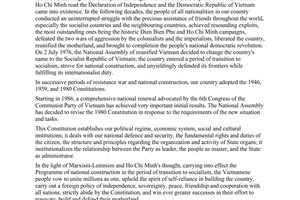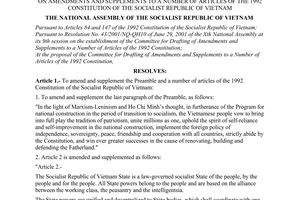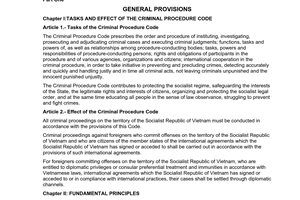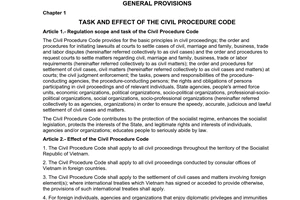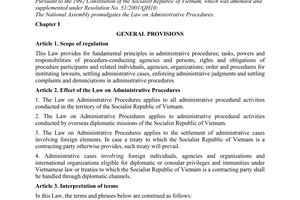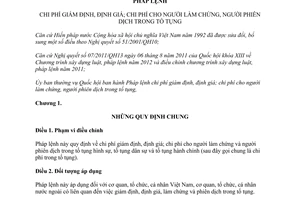Nội dung toàn văn Ordinance No. 02/2012/UBTVQH on assessment and valuation expenses and expenses
|
THE NATIONAL
ASSEMBLY |
SOCIALIST
REPUBLIC OF VIETNAM |
|
Ordinance No. 02/2012/UBTVQH |
Hanoi, March 28, 2012 |
ORDINANCE
ON ASSESSMENT AND VALUATION EXPENSES AND EXPENSES FOR WITNESS AND INTERPRETER IN LEGAL PROCEDURES
Pursuant to the 1992 Constitution of the Socialist Republic of Vietnam, which was amended and supplemented under Resolution No. 51/2001/NQ-QH10 bổ sung điều của Hiến pháp nước cộng hoà xã hội chủ nghĩa Việt Nam năm 1992">51/2001/QH10;
Pursuant to the Resolution No. 07/2011/QH13, of August 6, 2011, of National Assembly on the 2012 legislative program and adjusting the 2011 legislative program;
The National Assembly Standing Committee promulgates the Ordinance on Assessment and Valuation Expenses and Expenses for witness and interpreter in Legal Procedures,
Chapter I
GENERAL PROVISIONS
Article 1. Scope of regulation
This Ordinance provides assessment and valuation expenses; and expenses for witness and interpreter in criminal, civil and administrative procedures (hereinafter referred to as expenses in legal procedures).
Article 2. Subjects of application
This Ordinance applies to Vietnamese and foreign agencies, organizations and individuals relating to assessment, valuation, witness and interpretation activities in legal procedures.
Article 3. Interpretation of terms
In this Ordinance, the terms below are construed as follows:
1. Assessment expense means necessary and reasonable amounts to be paid for assessment work which is calculated by assessment organization or individual in accordance with this Ordinance and other relevant provisions of law.
2. Advance on assessment expense means an amounts temporarily calculated by an assessment organization or individual for performing assessment work at the request of a procedure-conducting agency.
3. Property valuation expense means necessary and reasonable amounts to be paid for valuation work which is calculated by a property valuation council or organization in accordance with this Ordinance and other relevant provisions of law.
4. Advance on property valuation expense means an amounts temporarily calculated by a property valuation council or organization for performing valuation work at the request of a procedure-conducting agency.
5. Property price appraisal expense means necessary and reasonable amounts to be paid for price appraisal work calculated by a price appraisal organization under this Ordinance and the law on pricing.
6. Expense for witness means necessary and reasonable amounts to be paid for a witness that is calculated by a procedure-conducting agency in accordance with this Ordinance and other relevant provisions of law.
7. Advance on expense for witness means an amounts temporarily calculated by a procedure-conducting agency for payment to a witness.
8. Expense for interpreter means necessary and reasonable amounts to be paid to an interpreter which is calculated by a procedure-conducting agency in accordance with this Ordinance and other relevant provisions of law.
Article 4. Principles of collection and payment of assessment and valuation expenses; expenses for witness and interpreter in legal procedures
Assessment and valuation expenses; expenses for witness and interpreter in legal procedures must be collected and paid in accordance with this Ordinance and other relevant provisions of law.
Article 5. Settlement of complaints and denunciations relating to assessment and valuation expenses; expenses for witness and interpreter in legal procedures
1. Individuals and organizations may file complaints with chief judges within 3 working days after receiving court’s notices of payment, exemption from or reduction of advance on assessment expense, assessment expense, advance on valuation expense, and advance on expense for witness.
Chief judges shall consider and settle complaints within 3 working days after receiving written complaints. Decisions of chief judges are final.
Complaints about the obligation to pay assessment and valuation expenses; expenses for witness and interpreter and expense levels under court judgments or decisions shall be settled in accordance with the procedure law.
2. Denunciations filed by individuals and their settlement comply with the law on denunciations.
Chapter II
ASSESSMENT EXPENSE IN LEGAL PROCEDURES
Section 1: ASSESSMENT EXPENSE REQUESTED BY PROCEDURE-CONDUCTING AGENCIES
Article 6. Agencies being responsible for paying advance on assessment expense
1. Criminal procedure-conducting agencies as prescribed by the Criminal Procedure Code.
2. Courts as prescribed by the Law on Administrative Procedures.
Article 7. Procedures for paying advance on assessment expense
1. An assessment-conducting organization or individual shall determine and notify the procedure-conducting agency specified in Article 6 of this Ordinance of the level of advance on assessment expense and the time limit for paying this advance.
2. Procedure-conducting agencies shall pay advances according to notices of assessment-conducting organizations or individuals.
Article 8. Responsibility for paying assessment expense
1. Procedure-conducting agencies specified in Clause 1, Article 6 of this Ordinance shall pay assessment expense at the level, within the time limit and by the method notified by organizations or individuals that have conducted assessment. For a criminal case initiated at the request of the victim, if the court declares the defendant innocent or the case terminated as prescribed in Clause 2, Article 105 of the Criminal Procedure Code, the procedure-conducting agency is not responsible for paying assessment expense. The victim shall return the paid assessment expense to the procedure-conducting agency.
2. The court specified in Clause 2, Article 6 of this Ordinance shall pay assessment expense in case the assessment result is meaningless for the settlement of the case. If the assessment result is meaningful for the settlement of the case, the losing party shall pay assessment expense in the order specified in Section 2 of this Chapter. The paid advance on assessment expense shall be returned to the procedure-conducting agency which has paid such advance.
Article 9. Determination of assessment expense
1. Based on the characteristics of a specific object and content of assessment, assessment expense may include one or some of the following items:
a/ Salary and remuneration for assessors;
b/ Expense for expendable supplies;
c/ Expense for service use;
d/ Expense for machine, device and means depreciation;
e/ Other expenses as provided by law.
2. The Government shall detail Clause 1 of this Article.
Article 10. Expense for additional assessment, re-assessment
Procedure-conducting agencies specified in Article 6 of this Ordinance which have issued decisions to request additional assessment or reassessment shall pay an advance on assessment expense and such expense in accordance with this Section.
Section 2: ASSESSMENT EXPENSE REQUESTED BY INVOLVED PARTIES
Article 11. Persons being obliged to pay advance on assessment expense
Persons who request for an assessment and accepted to issue decision on request for assessment by a court are obliged to pay an advance on assessment expense, including:
1. Involved parties in civil matters or cases;
2. Involved parties in administrative cases
Article 12. Persons enjoyed exemption from paying advance on assessment expense and such expense
The poor as prescribed by the Government is exempted from paying advance on assessment expense and such expense.
Article 13. Persons enjoyed reduction of advance on assessment expense and such expense
1. Persons meeting financial difficulties as certified by commune-level People's Committees of localities where they reside or by agencies, organizations for which they are working are entitled to reduction of advance on assessment expense and of such expense.
2. The exemption from and reduction of advance on assessment expense and such expense stipulated in Article 12 and Clause 1 of this Article are applicable to persons who have request assessment which are accepted by a procedure-conducting agency and the assessment is conducted by a public assessment organization.
Article 14. The obligation to pay advance on assessment expense
A person requesting a court to request assessment must pay advance on assessment expense, unless otherwise agreed by the involved parties or be enjoyed exemption from paying such advance as prescribed in Article 12 of this Ordinance.
2. In case the involved parties request the court to request assessment of the same object, they shall jointly pay advance on assessment expense, unless otherwise agreed by the involved parties or they are enjoyed exemption from paying such advance as prescribed in Article 12 of this Ordinance.
Article 15. Procedures for paying advance on assessment expense
1. Within 5 working days after receiving the court's decision on request of assessment, the assessment-conducting organization or individual must notify the court of the amount of advance on assessment expense.
2. Within 2 working days after receiving the notice of the assessment-conducting organization or individual, the court shall notify the payment of advance on assessment expense to the assessment requester for paying such advance to the court as prescribed in Article 20 of this Ordinance.
3. Within 2 working days after receiving an advance on assessment expense, the court must transfer this money to the assessment-conducting organization or individual.
Article 16. Procedures for request of exemption from paying advance on assessment expense
1. Within 5 working days after receiving the notice of payment of advance on assessment expense, the person obliged to pay such advance but is subject to be exempted as prescribed in Article 12 of this Ordinance shall file a written request with the court enclosed with a certified copy of a paper evidencing on subject of exemption from advance on assessment expense.
2. A written application for exemption from paying advance on assessment expense must contain the following main contents:
a/ Date of its making;
b/ Full name of the applicant;
c/ Object to be requested for assessment;
d/ Reason and ground for applying for exemption from paying advance on assessment expense as prescribed in Article 12 of this Ordinance.
Article 17. Competence to decide on exemption from paying advance on assessment expense
1. For civil and administrative cases, the competence to decide on exemption from paying advance on assessment expense is as follows:
a/ Before opening a court hearing, the judge assigned to settle the case may consider applications for exemption from paying advance on assessment expense and decide to accept or reject such applications within 05 working days after receiving them. Within 02 working days after being issued, this decision must be sent to the applicant and assessment-conducting organization or individual. In case of rejection, this decision must clearly state the reason therefore;
b/ During a court hearing, the trial panel may consider applications for exemption from paying advance on assessment expense and decide to accept or reject them. The decision of the trial panel must be announced at the hearing and sent to the applicant and assessment-conducting organization or individual within 2 working days after being issued. In case of rejection, this decision must clearly state the reason therefore:
2. For civil matters, the judge assigned to settle may consider applications for exemption from paying advance on assessment expense and decide to accept or reject such applications within 5 working days after receiving them. This decision must be sent to the applicant and assessment-conducting organization or individual within 02 working days after being issued. In case of rejection, this decision must clearly state the reason therefore.
Article 18. Procedures for request of reduction of advance on assessment expense
1. Within 05 working days after receiving notice of payment of advance on assessment expense, the person obliged to pay such advance but be subject to reduction of advance as prescribed in clause 1, Article 13 of this Ordinance must file with the court a written application enclosed with a certified copy of a paper evidencing on subject of reduction of advance on assessment expense.
2. An application for reduction of advance on assessment expense must contain the following main contents:
a/ The contents specified at Points a, b and c, Clause 2, Article 16 of this Ordinance;
b/ Reason and ground for applying for reduction of advance on assessment expense;
c/ Certification of the People's Committee of the commune, ward or township in which the applicant resides or the agency or organization for which he/she works of the reason for reduction of the advance on assessment expense as prescribed in Clause 1, Article 13 of this Ordinance.
Article 19. Competence to decide on reduction of advance on assessment expense
1. For civil and administrative procedures, the competence to decide on reduction of advance on assessment expense is as follows:
a/ Before opening a court hearing, the judge assigned to settle the case may consider applications for reduction of advance on assessment expense and decide to accept or reject such applications within 05 working days after receiving them. In case of acceptance, this decision must clearly state the reduced amounts; in case of rejection, it must clearly state the reason therefore. Within 02 working days after being issued, this decision must be notified to the applicant and assessment-conducting organization or individual.
b/ During a court hearing, the trial panel may consider applications for reduction of advance on assessment expense and decide to accept or reject such applications. The decision of the trial panel must be announced right at the hearing. In case of acceptance, this decision must clearly state the reduced amounts; in case of rejection, it must clearly state the reason therefore. Within 02 working days after being issued, the decision must be notified to the applicant and assessment-conducting organization or individual.
2. For civil matters, the judge assigned to settle the matter may consider applications for reduction of advance on assessment expense and decide to accept or reject such applications within 05 working days after receiving them. In case of acceptance, this decision must clearly state the reduced amounts; in case of rejection, it must clearly state the reason therefore. Within 02 working days after being issued, this decision must be sent to the applicant and assessment-conducting organization or individual.
Article 20. Time limit for paying advance on assessment expense
1. The person requesting a court to request assessment shall pay advance on assessment expense within the following time limit:
a/ Ten working days after receiving the notice of the court specified in Clause 2, Article 15 of this Ordinance. This time limit may be extended but not exceeding 5 days in case because of force majeure event or an objective obstacle;
b/ Five working days after receiving the decision on rejection of the application for exemption from paying or reduction of advance on assessment expense or the decision on reduction of such advance specified in Article 17 and article 19 of this Ordinance.
2. Assessment-conducting organizations or individuals may refuse to perform assessment upon receiving a court’s notice of the assessment-requesting person’s failure to pay advance on assessment expense.
Article 21. Determination of assessment expense
Assessment expense shall be determined in accordance to Article 9 of this Ordinance.
Article 22. Payment of assessment expense
1. After having the assessment result, the organization or individual having performed the assessment shall notify the court and assessment-requesting person of the assessment expense.
2. Within 02 working days after receiving the notice, the court shall notify to the requesting-assessment person to come Court and pay assessment expense. Within 10 working days after receiving the court's notice, the assessment-requesting person must pay assessment expense. This time limit may be extended but not exceeding 15 days in case of force majeure event or an objective obstacle.
In case the paid advance on assessment expense is lower than the expense, the deficit must be paid; if the paid advance is higher than the expense, the difference shall be returned.
3. Persons who have paid assessment expense but are not obliged to do so as prescribed in Article 29 of this Ordinance shall be returned the paid amount.
4. In case assessment-requesting persons are exempted from or reduced of advance on assessment expense or such expense, procedure-conducting agencies which have requested assessment shall pay exempted or reduced amounts to assessment-conducting organizations or individuals.
Article 23. Procedures for requesting exemption from assessment expense
1. The person obliged to pay assessment expense but is subject to be exempted from such expense as prescribed in Article 12 of this Ordinance shall file with the court an application enclosed with a certified copy of a paper evidencing on subjection of exemption from assessment expense.
2. An application for exemption from assessment expense must contain the following main contents:
a/ The contents specified at Points a, b and c, Clause 2, Article 16 of this Ordinance;
b/ Reason and ground for applying for exemption from assessment expense as prescribed in Article 12 of this Ordinance.
Article 24. Competence to decide on exemption from assessment expense
1. The competence to decide on exemption from assessment expense is as follows:
a/ If the case has been settled without having to open a court hearing, the judge assigned to settle the case may decide on exemption from assessment expense;
b/ During a court hearing, the trial panel may decide on exemption from assessment expense;
c/ For civil matters, the judge assigned to settle the civil matter may decide on exemption from assessment expense.
2. The exemption from assessment expense must be written in court's judgments and decisions.
Article 25. Procedures for requesting reduction of assessment expense
1. The person obliged to pay assessment expense but is subject to be reduced such expense as prescribed in Clause 1, Article 13 of this Ordinance shall file with the court an application enclosed with a certified copy of a paper evidencing on subject of reduction of assessment expense.
2. An application for reduction of assessment expense must contain the following main contents:
a/ The contents specified at Points a, b and c, Clause 2, article 16 of this Ordinance;
b/ Reason and ground for requesting reduction of assessment expense;
c/ Certification of the People's Committee of the commune, ward or township where the applicant resides or the agency or organization for which he/she works of the reason for the reduction as prescribed in Clause 1, Article 13 of this Ordinance.
Article 26. Competence to decide on reduction of assessment expense
The competence to decide on reduction of assessment expense complies with Article 24 of this Ordinance.
Article 27. Procedures for deciding reduction of assessment expense
Persons specified in Article 26 of this Ordinance may consider applications for reduction of assessment expense and decide to accept or reject them; in case of acceptance, this decision must clearly state the reduced amount; in case of rejection, it must clearly state the reason therefore. Within 02 working days after being issued, this decision must be notified to the assessment-conducting organization or individual and the applicant.
Decision on reduction or non-reduction of assessment expense of the trial panel is announced at the court hearing and notified to the assessment-conducting organization or individual and the applicant within 02 working days after being issued.
Article 28. Reduction of advance on assessment expense and assessment expense
The level of reduction of advance on assessment expense or of assessment expense for persons specified in Clause 1, Article 13 of this Ordinance must not exceed 50% of the advance on assessment expense or of assessment expense which they are obliged to pay.
Article 29. The obligation to pay assessment expense
1. Unless otherwise agreed upon by involved parties or provided by law, the obligation to pay assessment expense is determined as follows:
a/ The assessment-requesting person shall pay assessment expense if the assessment result proves that his/her request is unfounded. If the assessment result proves that his/her request is only partly well-founded, he/she shall pay assessment expense with respect to the part of his/her request proved to be unfounded;
b/ The person rejecting the assessment request of another involved party in a case shall pay assessment expense if the assessment result proves that the assessment request is well-founded. If the assessment request is only partly well-founded, the person rejecting such assessment request shall pay assessment expense corresponding to the part of the request proved to be well-founded.
2. The court shall, pursuant to Clause 1 of this Article, decide on the obligation to pay assessment expense, exemption from and reduction of assessment expense and refund of assessment expense to involved parties in its judgments or decisions.
Article 30. Expense for additional assessment and re-assessment
The order and procedures for payment and settlement of advance on assessment expense and of assessment expense for additional assessment and re-assessment requested by involved parties comply with the provisions of this Section.
Section 3: ASSESSMENT EXPENSE IN OTHER CASES
Article 31. Expenses for assessment to settle civil matters in criminal cases
For a civil matter concurrently settled in a criminal case for which the civil plaintiff, the civil defendant or a person with related interests and obligations files an assessment request and such request is accepted by the procedure-conducting agency, advance on assessment expense or assessment expense is not required to be paid. The responsibility for payment of advance on assessment expense or assessment expense complies with Section 1 of this Chapter.
Article 32. Assessment expense in case assessment-requesting persons make assessment requests on their own
In accordance with the law on judicial assessment, involved parties in civil matters or cases or administrative cases, civil plaintiffs, civil defendants or persons with related interests and obligations in criminal cases who have requested procedure-conducting agencies to request assessment but their requests have rejected and then file assessment requests directly with assessment-conducting organizations or individuals, shall pay advance on assessment expense and assessment expense at the request of assessment-conducting organizations or individuals.
Chapter III
EXPENSE FOR PROPERTY VALUATION IN LEGAL PROCEDURES
Section 1: EXPENSE FOR PROPERTY VALUATION DECIDED BY PROCEDURE-CONDUCTING AGENCIES
Article 33. Agencies responsible for paying advance on property valuation expense
1. For criminal cases, procedure-conducting agencies which have issued property valuation decisions shall pay advance on property valuation expense to the property valuation council or organization.
2. For civil or administrative cases, the courts which have issued decisions on property valuation do not have to pay advance on valuation expense to the property valuation council or organization. Involved parties shall pay advance on valuation expense according to Section 2 of this Chapter.
Article 34. Notice of payment of advance on property valuation expense
1. The property valuation council or organization shall determine the advance on property valuation expense and notify it to an agency specified in Article 33 of this Ordinance.
2. The time and method of payment of advance on property valuation expense comply with the request of the property valuation council or organization.
Article 35. Expense for property valuation
1. Based on the characteristics of the object to be valued, expense for property valuation includes one or some of the following items:
a/ Salary and remuneration for valuators;
b/ Expense for collection and analysis of information on the object need to be valued;
c/ Expense for expendable supplies;
d/ Expense for use of other necessary services;
e/ Other expenses as prescribed by law.
2. The Government shall detail Clause 1 of this Article.
Article 36. Expense for additional valuation or re-valuation
The order and procedures for payment and settlement of advance on property valuation expense and of valuation expense for additional valuation or re-valuation decided by procedure-conducting agencies comply with this Section.
Article 37. Responsibility to pay asset valuation expense
1. For criminal cases, procedure-conducting agencies which have issued property valuation decisions under Clause 1, Article 33 of this Ordinance shall pay property valuation expense to the property valuation council or organization at the level, within the time limit and by the method already notified.
2. For civil or administrative cases, the courts which have issued property valuation decisions as prescribed in Clause 2, Article 33 of this Ordinance in the cases specified at Point b, Clause 1, Article 92 of the Civil Procedure Code or in cases deemed necessary by the courts as prescribed in Clause 1, Article 85 of the Law on Administrative Procedures shall pay valuation expense to the property valuation council or organization, if the valuation result proves that the valuation request of the court is unfounded. The obligation to pay property valuation expense complies with Section 2 of this Chapter.
Section 2: EXPENSE FOR PROPERTY VALUATION REQUESTED BY INVOLVED PARTIES
Article 38. Procedures for paying advance on property valuation expense
1. Within 05 working days after being established or receiving the court's decision requesting valuation, the property valuation council or organization shall notify to the court and valuation-requesting person to come Court and pay advance on property valuation expense; such notice must clearly state the advance amount, time limit and method of payment.
2. Within 02 working days after receiving the notice of the property valuation council or organization, the court shall notify the valuation-requesting person for paying advance on valuation expense to the court.
3. Within 10 working days after receiving the notice of the court as prescribed in Clause 2 of this Article, the valuation-requesting person shall pay advance on valuation expense, unless otherwise agreed upon by involved parties or provided by law. This time limit may be extended but not exceeding 15 days in case of a force majeure event or an objective obstacle.
4. Within 02 working days after receiving the advance on valuation expense, the court shall transfer it to the property valuation council or organization.
Article 39. The obligation to pay advance on property valuation expense
1. The property valuation-requesting person shall pay advance on property valuation expense, unless otherwise agreed upon by involved parties.
2. In case the involved parties fail to agree on the price and request the court to price or the court decides on price as prescribed in Point b, Clause 1, Article 92 of the Civil Procedure Code or in cases deemed necessary by the court under Clause 1, Article 85 of the Law on Administrative Procedures, each party shall pay half of the advance on property valuation expense. For a case involving many parties, the parties shall jointly pay advance on property valuation expense at the levels decided by the court.
3. The property valuation council or organization may refuse to perform property valuation when receiving a court’s notice of the valuation- requesting person's failure to pay advance on property valuation expense.
Article 40. Settlement of property valuation expense
1. After having the valuation result, the property valuation council or organization shall notify the court and assessment-requesting person of the valuation expense.
2. Within 02 working days after receiving the notice, the court shall notify such to the valuation-requesting person for paying valuation expense to the court. Within 10 working days after receiving the court's notice, the valuation-requesting person shall pay such expense. This time limit may be extended nut not exceeding 15 days in case of a force majeure event or an objective obstacle.
In case the paid advance on valuation expense is lower than the expense, the deficit shall be paid; if the paid advance is higher than the expense, the difference shall be returned.
3. Persons who have paid property valuation expense but are not obliged to do so as prescribed in Article 42 of this Ordinance shall be returned the paid evaluation expense.
Article 41. Expense for property valuation
Expense for property valuation shall be determined as prescribe in Article 35 of this Ordinance.
Article 42. The obligation to pay expense for property valuation
Unless otherwise agreed upon by involved parties or provided by law, the obligation to pay expense for property valuation shall be determined as follows:
1. The valuation-requesting person shall pay valuation expense if the valuation result proves that his/her request is unfounded.
2. The person rejecting a valuation request shall pay valuation expense if the valuation result proves that such request is well-founded.
3. In case the involved parties fail to agree on the property price and jointly request the court to decide on its valuation, each party shall pay half of the advance on property valuation expense. For a case involving many parties, the parties shall jointly pay advance on property valuation expense at the levels decided by the court.
4. In case the court issues a property valuation decision as prescribed in Point b, Clause 1, Article 92 of the Civil Procedure Code or in cases deemed necessary by the court as prescribed in Clause 1, Article 85 of the Law on Administrative Procedures, the obligation to pay valuation expense shall be determined as follows:
a/ Each involved party shall pay half of the valuation expense, if the valuation result proves that the court's valuation decision is well-founded;
b/ The court shall pay valuation expense if the valuation result proves that the court's valuation decision is unfounded.
5. In case of property valuation for division of property under common ownership or division of inheritance property, each person entitled to property division shall pay part of valuation expense in proportion to the property value divided to him/her.
6. In case the person who has paid advance on property valuation expense or property valuation expense is not obliged to do so, the person who is obliged to pay such expense under the court's decision shall return the former the paid amount.
7. The court shall, pursuant to Clauses 1, 2, 3, 4, 5 and 6 of this Article, decide on the obligation to pay valuation expense and return valuation expense for involved parties in its judgments or decisions.
Article 43. Expense for additional valuation or re-valuation
The order and procedures for payment and settlement of advance on valuation expense and of valuation expense for additional valuation or re-valuation requested by involved parties comply with this Section.
Article 44. Expense for property price appraisal
For property price appraisal expense in case involved parties request the court to request a property price appraisal organization as prescribed in Clause 5, Article 92 of the Civil Procedure Code, or Clause 1, Article 85 of the Law on Administrative Procedures, the person requesting property price appraisal shall pay such expense to the property price appraisal organization at the level and within the time limit requested by such organization.
Chapter IV
EXPENSE FOR WITNESS IN LEGAL PROCEDURES
Section 1: EXPENSE FOR WITNESSES SUMMONED BY PROCEDURE-CONDUCTING AGENCIES
Article 45. Agencies responsible for paying expense to witness
Procedure-conducting agencies which summon witnesses shall pay expense to them from annual operation funds of procedure-conducting agencies.
Article 46. Level of expense for witness
1. Based on each particular case, expense for witnesses summoned by procedure-conducting agencies includes one or several of the following items:
a/ Salary and remuneration for witnesses;
b/ Travel expense;
c/ Accommodation expense;
d/ Other expenses as prescribed by law.
2. The Government shall detail Clause 1 of this Article.
Section 2: EXPENSES FOR WITNESSES REQUESTED BY INVOLVED PARTIES
Article 47. Procedures for paying advance on expense for witness
1. For civil matters and cases and administrative cases, persons requesting the court to summon witnesses shall pay advance on expense for witness. The requestors shall provide information on the number of witnesses and their workplaces and residences and other necessary information as the basis for the court to determine the amount of advance on expense for witness.
2. Within 05 working days after receiving the requests of involved parties to summon witnesses, the court shall notify the requestors to pay advance on expense for witness to the court. Such notice must clearly state the advance amount and time limit of payment.
3. Within 05 working days after receiving the court's notice, persons requesting the court to summon witnesses shall pay advance on expense for witness.
Article 48. Level of advance on expense for witness
The level of advance on expense for witness is calculated equal to the level of expense for witness determined under Article 46 of this Ordinance.
Article 49. The obligation to pay expense for witness
Unless otherwise agreed by involved parties or provided by law, the obligation to pay expense for witness is prescribed as follows:
1. The person requesting the court to summon witnesses shall pay expense for witness, if the statements of witnesses conform to the objective facts of the case but not right with the request of the person having requested the court to summon witnesses or such statements do not conform to the objective facts of the case.
2. In case the statements of witnesses conform to the objective facts of the case and right with the request of the person having requested the court to summon witnesses, the involved party who has a request independent from the request of the person having requested the court to summon witnesses shall pay expense for witness.
3. The court shall, in pursuance to Clauses 1 and 2 of this Article, decide on the obligation to pay expense for witness and return such expense to involved parties in its judgments or decisions.
Article 50. Procedures for paying expense for witness
1. The court shall pay expense for witness.
2. In case the paid advance on expense for witness is lower than the expense, persons obliged to pay expense for witness shall additionally pay the deficit; if the paid advance is higher than the expense, they shall be returned the difference. Persons who have paid advance on expense for witness but are not obliged to do so as prescribed in Article 49 of this Ordinance shall be returned the paid amount.
Chapter V
EXPENSE FOR INTERPRETER IN LEGAL PROCEDURES
Section 1: EXPENSE FOR INTERPRETERS SUMMONED BY PROCEDURE-CONDUCTING AGENCIES
Article 51. Responsibility to pay expense for interpreter
Procedure-conducting agencies that summon interpreters shall pay expense for interpreter from their annual operation funds.
Article 52. Level of expense for interpreter
1. Based on each particular case, expense for interpreters summoned by procedure-conducting agencies includes one or several of the following items:
a/ Interpretation fee;
b/ Travel expense;
c/ Accommodation expense;
d/ Other expenses as prescribed by law.
2. The Government shall detail Clause 1 of this Article.
Section 2: EXPENSE FOR INTERPRETERS REQUESTED BY INVOLVED PARTIES
Article 53. Obligation to pay expense for interpreter
For civil matters and cases and administrative cases, persons requesting the court to summon interpreters shall pay expense to interpreters as agreed upon.
Article 54. Level of expense for interpreter
The level of expense for interpreters requested by involved parties complies with Article 52 of this Ordinance, unless otherwise agreed upon.
Chapter VI
FUNDS FOR PAYING ASSESSMENT AND VALUATION EXPENSES; AND EXPENSES FOR WITNESS AND INTERPRETER IN LEGAL PROCEDURES
Article 55. Funding sources for payment
1. Funds for paying assessment and valuation expenses and expenses for witness and interpreter payable by procedure-conducting agencies according to decisions issued in accordance with this Ordinance shall be provided by the state budget and incorporated in annual budget estimates of these agencies.
2. State budget funds shall be provided for paying assessment expenses in cases in which involved parties are exempted from or reduced assessment expense in accordance with this Ordinance.
Article 56. Estimation of funds and allocation of funds for payment
Annually, based on the previous year's actual assessment and valuation expenses and expenses for witness and interpreter, procedure-conducting agencies shall coordinate with finance agencies at the same level in preparing payment estimates for incorporation in their budget estimates and submit them to competent state agencies for decision in accordance with the law on state budget and allocation to procedure-conducting agencies for payment.
Article 57. Procedures for settlement of expenses
Procedure-conducting agencies shall pay expenses to assessment- or valuation- conducting organizations and individuals and expenses to witnesses and interpreters according to the procedures regulated by Government.
Chapter VII
IMPLEMENTATION PROVISIONS
Article 58. Effect
This Ordinance takes effect on January 1, 2013.
Article 59. Implementation detailing and guidance
The Government, the Supreme People's Court and the Supreme People's Procuracy shall, within the scope of their tasks and powers, detail the articles and clauses as assigned, and guide the implementation of this Ordinance.
|
|
ON BEHALF OF
THE NATIONAL ASSEMBLY |
------------------------------------------------------------------------------------------------------
This translation is made by LawSoft and
for reference purposes only. Its copyright is owned by LawSoft
and protected under Clause 2, Article 14 of the Law on Intellectual Property.Your comments are always welcomed
